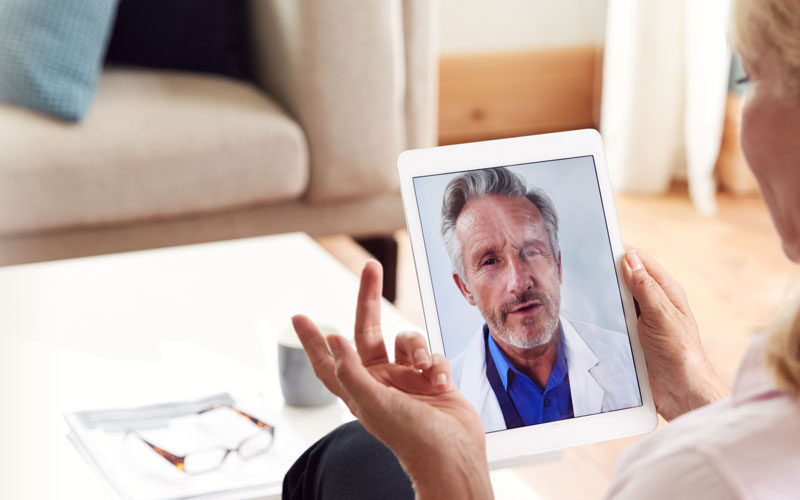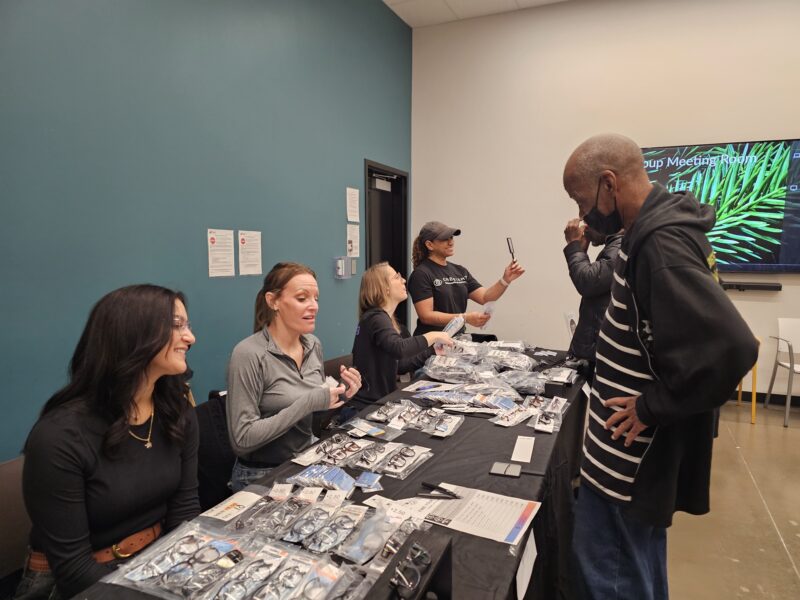As patients across the country seek safe ways to receive the eyecare they need, The Vision Council reached out to one of the doctors in our network to get their feedback and advice about telehealth (or telemedicine).
We are pleased to share the following info from Dr. Robert Chu, OD of EYEWORKS GROUP in the Dallas-Fort Worth region. Dr. Chu and his family have served the region for over 35 years and are considered one of the area’s premier centers for vision care. The practice includes both optometrists and ophthalmologists.

What services are you able to provide now during the COVID-19 crisis?
Given the rapid and dramatic changes in the world today, providers and patients are having to be creative to provide the level of care our patients desperately need. We are all in this together.
Optometrists and ophthalmologists are ‘essential’. Therefore, we have remained open to provide medical eye services, replacement glasses, and contact lenses. We have rescheduled elective surgeries such as cataract surgery and LASIK to maximize safety and maintain focus on the most urgent eye health needs.
How are you “seeing patients” during this time?
Maintaining the quality of the doctor-patient relationship is paramount. We are seeing patients in one of three ways currently.
Telemedicine – Patient at home/doctor at home. Usually this model is for home-bound patients or those with medical concerns such as immunodeficiency.
Hybrid Care Model – Patient in clinic/doctor at remote clinic. When scheduling does not permit full doctor coverage, we can employ this hybrid model. This is when the trained technicians that are on-site with the patients perform any necessary testing and data collection. Then the doctor sees the patient by secure teleconference in the exam room. Under this model, practices can only bill for the testing under a ’technical component’ modifier and cannot bill for the office visit.
Traditional Model – Patient in clinic/doctor in clinic. During the COVID-19 pandemic, we are taking extra precautions to ensure the safety of our patients and staff. However, we are still welcoming medically necessary appointments.
Are telehealth appointments safe and private? What questions should someone ask to make sure?
Yes, Telehealth appointments are safe and private, when HIPAA compliant platforms are used. With the current state of the world, legislators have eased the regulations on telehealth to allow for more patients to receive the care they need. You should always ask to confirm HIPAA compliance prior to being seen, though.
We use GetSetCare by Eye Care Pro. It is mobile-optimized and HIPAA complaint. It works great for our needs
How can I tell if my eye doctor will take telehealth appointments?
Many doctors’ offices will offer some level of telehealth appointment. The best way to be sure is to call them. Along with any specific concerns you have, you will want to be sure to ask them:
Do you offer telehealth appointments?
Can you treat my specific condition or respond to my specific situation via telemedicine, or will I need to wait for an in-person appointment?
Will the telehealth appointment be secure and/or managed through a HIPAA compliant platform?
Will my insurance cover the telehealth appointment?
Insurance, that’s a great point! Will insurance cover a telehealth appointment?
That depends. Medical insurances have special codes and different levels of coverage for telehealth appointments. Vision plans generally do not cover telehealth appointments. However, in those cases patients can pay for the office visit out of pocket, then still use their material benefits under those vision plans.
What kind of eyecare concerns can safely be addressed through a telehealth appointment?
Many eye care concerns can be safely addressed through a telemedicine appointment. Some examples include: red eyes, eyelid issues, dry eyes, pink eyes, allergies, contact lens concerns, prescription refills, and follow up visits. It should be noted that there is a significant difference between telemedicine and remote refraction.
Telemedicine is a positive. It can extend patient care to otherwise underserved communities. Going forward, our practice will continue to leverage telemedicine in greater ways, specifically for follow ups and improving patient compliance.
Remote refraction, on the other hand, is usually intended to determine a glasses/contact lens prescription for online sales. This neglects the critical components of a comprehensive eye health exam with your eye care provider.
There is no substitute for a doctor thoroughly examining a patient’s external and internal eye health; that can only take place during an in-person visit.
Can I get a new prescription during a telehealth eye doctor appointment?
Some prescription drug refills can be obtained through a telemedicine eye doctor appointment. However, new prescriptions for vision correction such as glasses and contacts should be expertly verified at your eye doctor’s office. Only they have the advanced equipment, staff, and training necessary to ensure you are getting the most accurate vision correction prescription.
I think my eye doctor is closed right now due to COVID-19. Can I schedule a telehealth appointment with someone else?
Yes, a major benefit of telehealth is that it has no geographic boundaries. So, a patient in New York can schedule with a provider located in California, if the provider is licensed to practice in New York. But, check with your current provider, first. Even though they may be ‘closed’, they are likely responding to phone and email inquiries and may offer a telehealth or other emergency/urgent care solution.
Finally, what are some examples of types of patients and their ailments that you have been able to treat via telemedicine?
We regularly treat a diabetic patient who is immunocompromised; they prefer not to leave their home for obvious reasons. We see them to treat eye infections and eye lid infections.
We also recently treated a 95 year-old woman in a nursing home who could not get a ride to the office. She had an eye infection that healed but had unfortunately returned. We were able to perform a telemedicine visit to confirm the new infection and set her up with the needed medication prescription.
Additionally, we treated an immunocompromised patient that was suffering through “flashes” and “floaters” for two weeks, hoping they would go away. Via a telemedicine appointment, he was able to see a doctor who educated him on the urgent nature of his symptoms. The patient came in the next day and was found to have a retinal detachment that required emergency surgery to save his sight.
Our patients are very thankful for the increased level of safety and convenience that telemedicine offers! It has been a win-win for all of us!
You can learn more about Dr. Chu and EyeWorks Group at https://www.eyeworksgroup.com/. Follow them on Facebook and Instagram.






